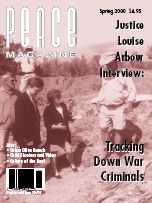
Peace Magazine Spring 2000, page 7. Some rights reserved.
Search for other articles by Bishop Artemije here
Abridged excerpts from the statement of Serbian Orthodox Bishop Artemije of Kosovo to the U.S. Congress, Helsinki Commission Hearing Feb. 28, 2000
After the end of the Kosovo war the repression of Milosevic's undemocratic regime was supplanted by the repression of extremist Kosovo Albanians against Serbs and other non-Albanian communities. Not only are Serbs being driven from the Province but also the Romas, Slav Moslems, Croats, Serb speaking Jews, and Turks. More than 80 Orthodox churches have been either completely destroyed or severely damaged since the end of the war. This happens in the presence of KFOR and the United Nations. Kosovo is becoming ethnically clean.
Two-thirds of the pre-war Serb population (200,000 people) fled the Province under Albanian pressure. More than 50.000 Romas, Slav Moslems, Croat Catholics, and others have also been cleansed from Kosovo. More than 400 Serbs have been killed and nearly 600 abducted by Albanian extremists during this same period of peace. This is a tragic record for any post war peace mission.
There is evidence that the KLA leaders bear direct responsibility for the most of the post-war crimes and acts of violence. As soon as KFOR entered the Province KLA gunmen took over power in cities and towns and organized illegal detention centers for Serbs, Romas, and Albanian "collaborators." They began killing people and seized property previously owned by non-Albanians. KLA groups and their leaders are directly linked with Albanian mafia clans and have developed a sophisticated network of organized crime, drug smuggling, prostitution, white slavery, and weapons trading. Quarter by quarter a city would be cleansed of Serbs and their property would be either burned or sold for a high price to Albanian refugees (including Albanians from Albania and Macedonia who flowed into the province through unprotected borders along with the hundreds of thousands of Kosovo refugees). The KLA, although officially disbanded, is still active and their secret police continue their intimidation and executions. Now more and more of their victims are disobedient Kosovo Albanians who refuse to pay "taxes" and "protection money" to extremists.
Many non-Albanians still do not have access to hospitals, the university, and public services, and can move only under the KFOR military escort. The Serbian language is completely banished from the public life. All Serb inscriptions, road signs and advertisements have been removed and the use of Serbian language in Albanian areas is reason enough for anyone to be shot right on the spot. Almost all Serb shops are now in Albanian hands. Albanians are pressuring Serbs to sell their property under threats and extortion. Those who refuse usually have their houses torched or are killed as an example to other Serbs. Grenade attacks on Serb houses and the few remaining Serb shops and restaurants force more Serbs to leave Kosovo.
On one hand, KFOR's presence in Kosovo has freed Albanian extremists to do what they want because KFOR priorities has avoided direct confrontation with the extremists in order to escape possible casualties. On the other hand, we cannot but say that if KFOR had not been in Kosovo during this rampage of hatred, not a single Serb or Serb church would have survived. We appreciate the efforts of men and women from all over the world who are trying to bring peace to Kosovo even within a narrow framework in which KFOR must act.
An especially volatile situation is in Kosovska Mitrovica, the only major city where a substantial number of Serbs remain. KFOR, aware that the free access of Albanian extremist groups to Mitrovica would cause a Serb exodus, blocked the bridge connecting the southern and northern part of the city. Albanian extremists have since tried to make their way into the northern part of Mitrovica. The Belgrade regime is trying to profit from this situation and consolidate the division of Mitrovica for their own reasons. Each Serb victim in Kosovo strengthens Milosevic's position in Serbia.
We have a few practical proposals for improving the situation in Kosovo:
Serbian Orthodox Diocese of Kosovo and Metohija
Gracanica Monastery, Pristina, Kosovo and Metohija

Peace Magazine Spring 2000, page 7. Some rights reserved.
Search for other articles by Bishop Artemije here